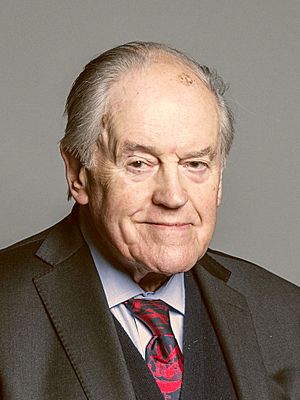Robert Armstrong, Baron Armstrong of Ilminster facts for kids
Quick facts for kids
The Lord Armstrong of Ilminster
|
|
|---|---|

Official portrait, 2018
|
|
| Member of the House of Lords Lord Temporal |
|
| In office 26 February 1988 – 3 April 2020 Life peerage |
|
| Principal Private Secretary to the Prime Minister | |
| In office 1970–1975 |
|
| Prime Minister | |
| Preceded by | Alexander Isserlis |
| Succeeded by | Kenneth Stowe |
| Permanent Under-Secretary of State at the Home Office | |
| In office 1977–1979 |
|
| Prime Minister | James Callaghan |
| Preceded by | Sir Arthur Peterson |
| Succeeded by | Brian Cubbon |
| Cabinet Secretary | |
| In office 1979–1987 |
|
| Prime Minister | Margaret Thatcher |
| Preceded by | Sir John Hunt |
| Succeeded by | Sir Robin Butler |
| Head of the Home Civil Service | |
| In office 1981–1987 |
|
| Prime Minister | Margaret Thatcher |
| Preceded by | Sir Douglas Allen |
| Succeeded by | Sir Robin Butler |
| Personal details | |
| Born |
Robert Temple Armstrong
30 March 1927 Headington, Oxford, England |
| Died | 3 April 2020 (aged 93) |
| Political party | Crossbench |
| Spouses |
|
| Relations | Sir Thomas H. W. Armstrong (father) |
| Children | 2 |
| Education | Dragon School Eton College |
| Alma mater | Christ Church, Oxford |
| Occupation | Civil servant |
Robert Temple Armstrong, Baron Armstrong of Ilminster (born March 30, 1927 – died April 3, 2020) was a very important British civil servant. A civil servant is someone who works for the government but is not an elected politician. He also became a life peer, which means he was given a special title and a seat in the House of Lords for his lifetime.
Contents
Early Life and Education
Robert Armstrong was born in Headington, England, on March 30, 1927. He was the only son of Sir Thomas H. W. Armstrong, a musician, and his wife, Hester M. Draper.
He went to two well-known schools: the Dragon School and then Eton College. After that, he studied at Christ Church, Oxford, a famous university.
In 1953, Robert Armstrong married Serena Mary Benedicta Chance. They had two daughters, Jane and Teresa. Later, their marriage ended, and in 1985, he married Mary Patricia Carlow.
A Career in Government
Robert Armstrong had a long and successful career working for the British government. He worked in several important departments, including the HM Treasury (which manages the country's money) and the Home Office (which deals with law and order).
From 1970 to 1975, he was the Principal Private Secretary to two Prime Ministers: Edward Heath and Harold Wilson. This role meant he was a chief advisor and assistant to the Prime Minister.
He was made a "Knight" in 1978, which is an honor given by the Queen or King. From 1979 to 1987, he held one of the most powerful non-political jobs in the UK government: Cabinet Secretary. He served under Prime Minister Margaret Thatcher. As Cabinet Secretary, he was the top civil servant, advising the Prime Minister and helping the government run smoothly.
The "Spycatcher" Case
In 1986, Robert Armstrong was a key witness in a famous court case. The British government wanted to stop a book called Spycatcher from being published. The book was written by Peter Wright, a former member of MI5 (Britain's security service). The government said the book contained secret information.
During the trial, Robert Armstrong used a phrase that became very famous: "economical with the truth". This phrase means telling only part of the truth, or being careful with what you say, so you don't reveal everything. This phrase was later added to the Oxford Dictionary of Quotations.
Even though the British government tried to stop the book, Peter Wright's lawyer, Malcolm Turnbull (who later became the Prime Minister of Australia), won the case. The book was eventually published.
Later Years
After his long career, Robert Armstrong was given the title Baron Armstrong of Ilminster in 1988. This meant he became a life peer and could sit in the House of Lords, which is part of the UK Parliament. He sat as a crossbencher, meaning he didn't belong to any specific political party.
From 1994 to 2006, Lord Armstrong was the Chancellor of the University of Hull. He also chaired the Sir Edward Heath Charitable Foundation until 2013.
Death
Robert Armstrong died on April 3, 2020, at the age of 93.
See also
- Baron Armstrong
 | Emma Amos |
 | Edward Mitchell Bannister |
 | Larry D. Alexander |
 | Ernie Barnes |

